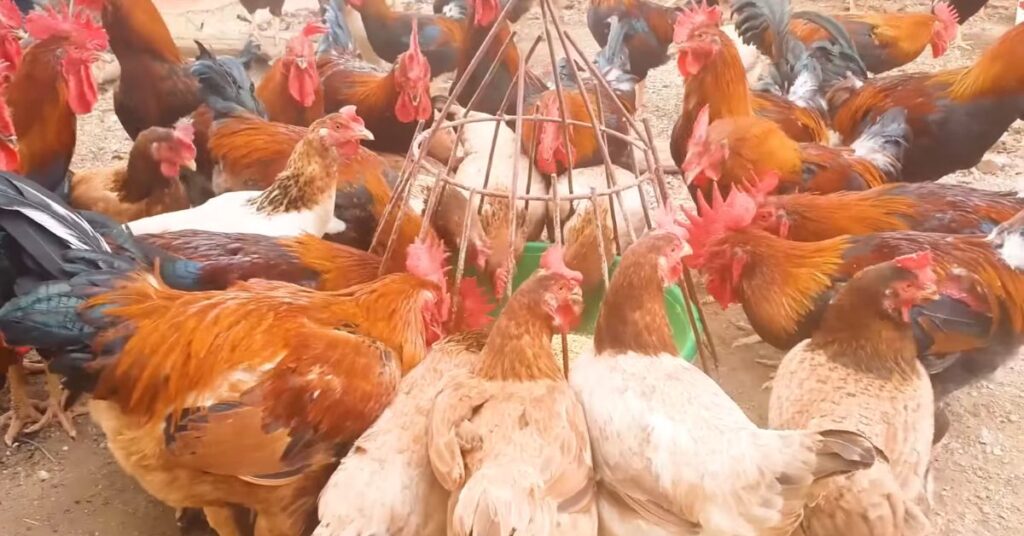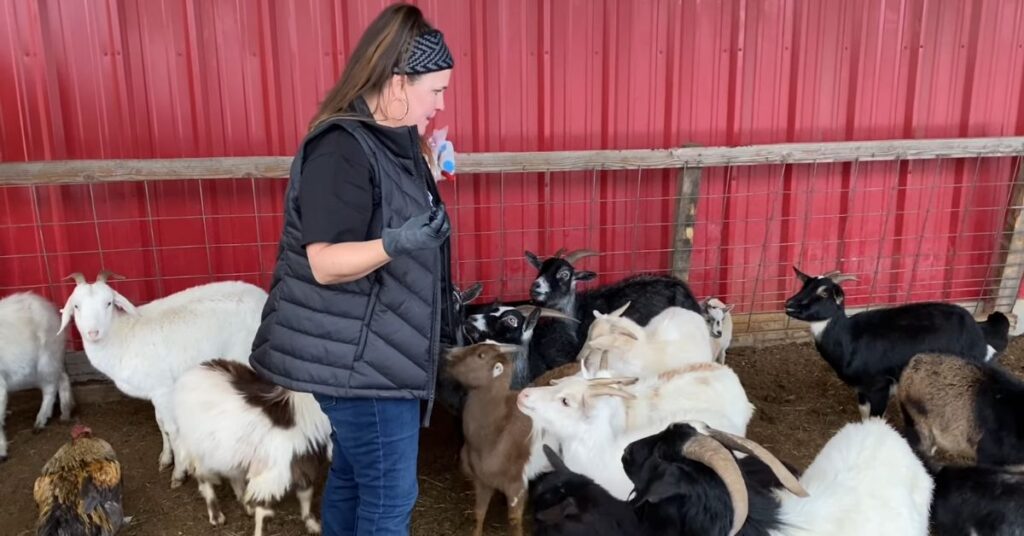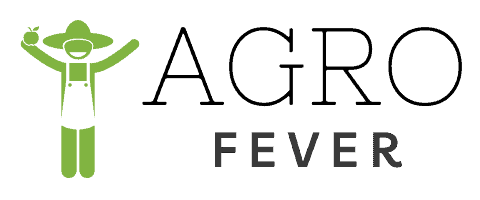Raising chickens and goats together on a small farm or homestead can provide many benefits. However, when it comes to feeding time you may find your chickens eyeing the goat’s feed. Chickens are natural foragers and will eat just about anything they can get their beaks on. But is goat feed healthy for chickens? What are the differences between chicken feed and goat feed?
As a chicken keeper, you want to provide your flock with optimal nutrition to keep them healthy and productive. While chickens can eat certain types of goat feed in moderation, goat feed should never make up the bulk of a chicken’s diet. Chickens have different nutritional requirements than goats.
Read on to learn whether goats and chickens can safely share feed, the benefits and risks of feeding goat feed to chickens, and how much goat feed chickens can eat.
What Do Chickens Eat?
Before we discuss goat feed, let’s look at the unique nutritional needs of chickens. Chickens are omnivores, meaning they eat both plant and animal matter. Their diet in the wild consists of:
- Insects
- Worms
- Seeds
- Grains
- Fruits
- Vegetables
- Small animals
Modern chickens still have this natural inclination to forage. However, commercial chicken feeds are formulated to provide all the protein, carbohydrates, vitamins, and minerals chickens need in a balanced ratio. Here are some standard types of chicken feed:
Starter Feed
Fed to baby chicks from hatch until 6-8 weeks old. Very high in protein, around 20-22%. Helps chicks grow quickly.
Grower Feed
Provided to pullets (young hens) from 6-18 weeks old. Lower in protein than starter feed, usually 16-17%. Allows continued growth at a moderate pace.
Layer Feed
Fed to mature hens for egg production. High in calcium and protein, around 16-18%. Provides nutrients for eggshell formation.
Broiler Feed
Specialized diet for meat chickens. Promotes rapid muscle growth with extra protein and calories.
Flock Raiser
All-purpose feed for chicks over 8 weeks and mixed flocks. Lower protein around 16%.

Chicken feed provides a balanced diet so supplemental feeding is not required. However, many chicken-keepers offer treats like scratch grains, fruits, and vegetables for variety. Clean, fresh water must also be available at all times.
What Do Goats Eat?
Now let’s look at the dietary needs of goats. Goats are herbivores, meaning their natural diet consists entirely of plant matter such as:
- Grasses
- Leaves
- Twigs
- Bark
- Shrubs
Goats do best on a high-fiber, high-roughage diet. Unlike chickens, goats have a specialized four-chambered stomach that allows them to break down and digest fibrous plant material.
Goats also have different nutritional requirements than chickens. Here are some common types of commercially-produced goat feed:
Grain Mix
A blend of grains like oats, barley, and corn provides carbohydrates for energy. May include beet pulp or soybean meal for added protein.
Goat Pellets
Complete feed in pellet form, containing grains, molasses, vitamins, and minerals. 12-14% protein content.
Goat Textured Feed
Extruded complete feed with a rough texture goats prefer. Contains added ammonium chloride.
Alfalfa Hay
Leafy green legume hay that is high in protein, calories, and calcium.
Grass Hay
Lower in protein and calories than alfalfa. Provides fiber and roughage.

While commercial feeds are formulated for goats, they also enjoy browsing on shrubs, trees, weeds and can supplement their diet through grazing. Fresh water and loose minerals are imperative.
Now that we’ve looked at the differences in what chickens and goats naturally eat, let’s discuss whether they can eat each other’s feed.
Can Chickens Eat Goat Feed?
So can chickens eat goat feed? The short answer is yes, chickens can eat certain types of goat feed in moderation. Specifically, chickens can eat goat feed that consists mainly of grains, such as a goat grain mix. Chickens can also pick through and eat components of a goat pellet feed.
However, goat feed should never make up the bulk of a chicken’s diet. Chickens have different nutritional requirements than goats.
Here’s a more in-depth look at how well chickens can utilize different types of goat feed:
Goat Grain Mix
This type of goat feed consists mainly of grains like corn, barley, oats and sometimes beet pulp. Chickens can digest whole grains well and utilize them as a source of carbohydrates. So yes, chickens can eat a goat grain mix.
However, grains are not high in protein. While chickens enjoy grains, a diet of only grains would be deficient in protein.
Goat Pellets
Complete goat feeds that have been compressed into pellet form contain grains plus added protein, vitamins, and minerals. Chickens can pick through and eat components of goat pellets.
However, the pellets themselves are too large and dense for most chickens to consume. It’s also difficult for chickens to pick out individual ingredients from a complete pellet feed.
Goat Textured Feed
Textured or “sweet” goat feeds have a rough, crunchy texture goats crave. Chickens can eat small pieces but rarely consume much of this type of large, extruded feed.
Alfalfa Hay
Chickens can pick through and eat the leaves of alfalfa hay. However, chickens cannot properly digest the thick, fibrous stems. Alfalfa is also very high in protein, calcium, and calories compared to a chicken’s needs.
Grass Hay
Chickens can nibble on grass hay but do not derive much nutritional value from the tough, dry stalks. The hay may provide some roughage but lacks the protein and nutrients chickens require.
Overall, while chickens can pick through and eat portions of some goat feeds, goat feed should not make up the main portion of a chicken’s diet. Chickens have different nutritional requirements than goats.
Now let’s look at some of the benefits as well as risks of chickens eating goat feed.
Benefits of Goat Feed for Chickens
While goat feed shouldn’t be a substantial part of a chicken’s diet, there are some benefits to chickens getting a small portion of goat feed:
Additional Protein
Goat feeds typically contain 12-14% protein. While lower than the 16-22% protein in chicken feed, it can provide supplemental protein.
Added Calories
Goat feed formulated for high production contains extra calories chickens can utilize for growth and egg production.
Variety
The different textures and flavors of goat feed components add variety to stimulate a chicken’s appetite.
Gut Health
Some goat feeds contain prebiotics that can promote good bacteria and digestive health in chickens.
Vitamins and Minerals
Goat feeds contain added vitamins like A, D3, E and B12 and minerals like calcium, phosphorus, selenium and zinc which are also essential to chickens.
As long as they are still eating a nutritionally complete chicken feed, chickens can gain some benefits from the supplemental nutrition in small amounts of goat feed. Still, there are some potential risks to be aware of when feeding goats and chickens together.
Risks of Feeding Goat Feed to Chickens
While the occasional snack on goat feed generally won’t harm chickens, there are some risks to be aware of:
Nutritional Imbalances
If goat feed makes up too much of a chicken’s diet, they may not get the protein, amino acids, vitamins and minerals chickens need in the correct ratios.
Medications
Some goat feeds contain medications like the coccidiostat decoquinate or rumen modifiers like monensin. These can be toxic to chickens. Never feed chickens medicated goat feed.
Enterotoxemia
A protein overload from too much goat feed could cause a deadly condition in chickens called enterotoxemia. It leads to intestinal damage and death.
Copper Toxicity
Goat feeds contain added copper. Chickens are sensitive to excess copper. Feeding chicken feed too high in copper can harm the liver and kidneys.
Digestive Upset
The unfamiliar texture and composition of goat pellets and textured feeds may irritate the digestive tract of chickens if consumed regularly.
Competition
When fed together, chickens tend to bully goats away from feed. Goats require unrestricted access to feed at all times.
To mitigate these risks, chickens should not receive goat feed free-choice. Limit goat feed to a small supplement or the occasional treat. Never allow chickens access to medicated goat feed.
How Much Goat Feed Can Chickens Eat?
The amount of goat feed chickens can eat depends on the type of goat feed and the overall diet. Here are some general guidelines based on the nutritional needs of chickens:
Laying Hens
Up to 10% of the diet
Meat Chickens
Up to 5% of the diet
Baby Chicks
None until fully feathered
Mature Chickens
Up to 10% of the diet
During Molt
Up to 10% of the diet
Goat feed should never exceed 10% of a chicken’s intake. Chickens should always have free-choice access to an appropriate chicken feed and fresh water.
Monitor your chickens to make sure goat feed intake remains low. Restrict access if chickens start eating goat feed voraciously or if signs of nutrient imbalance occur.
Now let’s go over what to feed chickens instead of goat feed to make sure their nutritional needs are met.
Alternatives to Goat Feed for Chickens
While chickens can eat some goat feed, there are better alternatives to provide supplemental nutrition. Some healthy options include:
Scratch Grains
Whole grains like corn, wheat, oats, and barley can be fed as a supplemental treat.
Leafy Greens
Chopped kale, spinach, lettuce and other greens provide vitamins and minerals.
Vegetable Scraps
Small amounts of veggies like carrots, squash and peas make great low-calorie treats.
Fruits
Bits of apple, berries, melons and other fruits offer variation.
Mealworms
High in protein, these provide a treat plus important amino acids.
Yogurt
Offers probiotics for digestion. Chickens love yogurt!
Oyster Shell
Provides calcium, especially important for laying hens.
These alternatives give chickens supplemental nutrition from natural, wholesome sources. They also provide mental stimulation through pecking and foraging which promotes natural chicken behavior.
Signs of a Goat Feed Allergy in Chickens
Just like humans, some chickens may have an individual allergy or sensitivity to certain ingredients in goat feed. Here are signs your chicken may have an allergy:
- Decreased appetite or eating less chicken feed
- Loose droppings
- Lethargy or low energy
- Sneezing, coughing, wheezing or respiratory distress
- Facial swelling
- Itchy skin, feather picking
- Red, inflamed eyes
- Head shaking
- Poor body condition, decline in weight
If you observe any of these symptoms, remove access to goat feed immediately. Feed an elimination diet of plain chicken feed and water only for 2 weeks to see if symptoms resolve. Then reintroduce goat feed slowly while monitoring for recurrence of symptoms.
In severe cases, antihistamines or steroids may be prescribed by an avian veterinarian. Discuss any concerns with your avian vet.
Can Baby Chicks Eat Goat Feed?
Baby chicks have very different nutritional needs than mature chickens. They require a very high protein diet of approximately 20-22% protein for proper growth and development.
Goat feed is not suitable for chicks under 4-6 weeks old. Baby chicks should only be fed an age-appropriate starter feed specifically formulated for chicks along with fresh water.
Once chicks are fully feathered at 4-6 weeks, they may begin to pick at small amounts of goat grain feed. But the bulk of their diet should still consist of a grower feed until 16-18 weeks of age when pullets are mature enough to transition to layer feed.
Do not offer goat feed to chicks under 6 weeks old as it could lead to nutrient deficiencies during this critical growth phase.
Can Goats and Chickens Share Feed?
Ideally chickens and goats should have separate feeds customized to their differing nutritional requirements. However, in a backyard farming setting, you may wish to allow chickens to free-range and supplement themselves from a shared goat feed source. Here are some tips for feeding goats and chickens together:
- Use a goat grain mix without medications, not goat pellets or textured feed. Chickens can pick through a grain mix more easily.
- Feed in different areas of the pen or pasture so both species get adequate intake.
- Provide plenty for all animals, scattering feed widely to reduce competition. Goats should always have unrestricted access.
- Check that all animals are maintaining proper body weight and condition. No decline in growth or production.
- Make sure separate species-appropriate feed is also available free-choice as the base of their diet.
- Try feeding at different times of day, with goat feed in mornings and chicken feed in evenings to reduce squabbling.
With proper management, housing chickens and goats together can be done successfully. But be sure to monitor body condition and production levels closely to make sure nutritional needs are being met. Consult your veterinarian if any deficiency signs arise.
Conclusion
Chickens are natural foragers and will sample just about any type of animal feed they come across. But while chickens can eat some goat feed, it should never make up a substantial portion of their diet.
Chickens have different nutritional requirements than goats, especially for protein. Eating too much goat feed could lead to nutrient deficiencies or toxicity.
The healthiest diet for chickens consists mainly of a species-appropriate commercial feed. Up to 10% of their intake can come from supplemental sources like goat grain mixes. But restrict access if chickens are overindulging.
By understanding the differences between chicken and goat nutritional needs, you can safely incorporate small amounts of goat feed as a supplemental treat while ensuring your chickens get a balanced diet. With proper management, chickens and goats can be fed together successfully on the small farm or homestead.
I hope this article has helped explain whether chickens can eat goat feed and how to do it safely. Let me know if you have any other questions!
